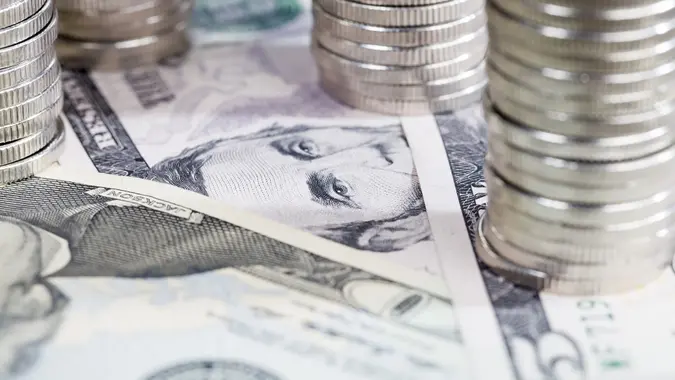Current CD Rates for February 6, 2026

Commitment to Our Readers
GOBankingRates' editorial team is committed to bringing you unbiased reviews and information. We use data-driven methodologies to evaluate financial products and services - our reviews and ratings are not influenced by advertisers. You can read more about our editorial guidelines and our products and services review methodology.

20 Years
Helping You Live Richer

Reviewed
by Experts

Trusted by
Millions of Readers
Have extra cash? A certificate of deposit (CD) may be a good place to invest your funds. Today’s best CD rate is 5.11% annual percentage yield (APY) on a 12-month term from Daniels-Sheridan Federal Credit Union, with a $500 minimum deposit. CDs are federally insured by the Federal Deposit Insurance Corporation (FDIC) for banks and the National Credit Union Administration (NCUA) for credit unions, and with current CD rates still strong, now may be a good time to lock one in.
Current CD Rates by Term for Feb. 6, 2026
| Term | Institution | APY | Minimum Deposit |
|---|---|---|---|
| 3 months | Northern Bank Direct | 4.15% | $500 |
| 6 months | United Fidelity Bank | 4.20% | $1,000 |
| 12 months | Daniels-Sheridan Federal Credit Union | 5.11% | $500 |
| 2 years | Mountain America Credit Union | 4.20% | $500 |
| 5 years | United Fidelity Bank | 4.15% | $1,000 |
Editor’s Pick of the Day
- Term: 5-year CD
- APY: 4.15%
- Minimum deposit: $1,000
- Where to open: United Fidelity Bank
- Why we like it: Great if you’re saving for big goals and want dependable, long-term growth.
Why CD Rates Change
Banks set their own CD rates based on the economy, competition and their financial or marketing goals.
One of the biggest influences on CD rates is the federal funds rate, which is the short-term interest rate set by the Federal Reserve’s Federal Open Market Committee.
When the Fed raises or lowers this rate, banks usually follow. A higher federal funds rate often leads to better CD yields, while rate cuts can cause them to drop.
Inflation and competition also play a role — when inflation is high or banks want to attract more deposits, they may offer higher APYs.
National Average CD Rates and Trends
Curious how CD rates have moved over time? Here’s a look at recent national averages and how they’ve shifted with the Fed’s rate changes.
- National average CD rates rose sharply from mid-2022 through early 2024 as the Fed increased interest rates to fight inflation.
- After three rate cuts in 2025, CD rates have started to level off and slightly decline.
- Short-term CDs saw the biggest changes, while long-term rates have remained more stable.
CD Rate Outlook for 2026
The Federal Reserve cut rates three times in 2025, signaling that current CD rates could continue to edge lower through the beginning of 2026.
The best CD rates right now are hovering around 4.15% to 5.11%, with short-term CDs showing the most movement as markets adjust to the Fed’s policy changes.
If you want to capitalize on today’s top rates, consider opening a CD account soon — ideally one that aligns with your savings goals and won’t tie up cash you may need in the next two years.
What To Consider Before Opening a CD
Before locking in a rate, consider these key factors:
- Early withdrawal penalties: Check how much interest you’d lose if you withdraw funds before maturity and whether the CD is non-callable.
- Your timeline: Pick a CD term that matches your time horizon and when you’ll need access to your money.
- APY and compounding: Confirm the APY and how often the interest compounds on your CD.
- Insurance coverage: Make sure your CD is covered by the FDIC or NCUA and confirm the insurance limits.
- Auto-renewal details: Note when your CD renews so you can withdraw or reinvest before it rolls over automatically.
Pro Tip: Try CD Laddering
If you want steady returns without locking up all your cash, consider a CD ladder. This strategy lets you:
- Split your money across multiple CDs with staggered maturity dates.
- Earn higher rates on longer terms while keeping some cash accessible sooner.
- Reinvest each rung as it matures to take advantage of the best available APYs.
Final Takeaway
- If you have extra cash and are looking for a safe place to invest the money, consider investing in a CD.
- Minimum deposits start around $500 and you could earn up to 5.11% APY.
- CDs are a simple, low-risk way to grow your money over time.
Current CD Rates FAQ
High CD rates are catching the attention of consumers looking for a no-risk way to earn interest on their savings. Here are some of the questions they're asking before opening an account:- What is a good CD rate right now?
- Top CD rates currently fluctuate between 4.15% and 5.11% APY. Rates vary by term and institution.
- Are CD rates going up or down?
- The Federal Reserve cut rates three times this year, so current CD rates are moving downward.
- How often do CD rates change?
- There is no set time when CD rates change. They can often change around Federal Reserve meetings.
- Are CDs worth it in 2026?
- Yes, CDs are a good way to ensure set returns and are FDIC insured. You can also consider laddering as a strategy.
Compare CD Rates
- Best 3-Month CD Rates
- Best 6-Month CD Rates
- Best 1-Year CD Rates
- Best 5-Year CD Rates
- Best No-Penalty CD Rates
- Best Jumbo CD Rates
- Best No-Penalty CD Rates
- Best CDs With No Minimum Deposit Requirement
- Best CD Accounts
Daria Uhlig contributed to the reporting for this article.
Methodology: GOBankingRates analyzes deposit rates from banks and credit unions with nationwide availability. The best rates are identified from this group by focusing on APY. Institutions listed in the daily chart are insured by the Federal Deposit Insurance Corporation or the National Credit Union Share Insurance Fund.
Financial institutions may require certain eligibility criteria — such as membership, existing accounts or location-based restrictions — to open an account or qualify for the listed rates. Always verify account terms, conditions and regional availability with the institution before applying.
Editorial Note: This content is not provided by any entity covered in this article. Any opinions, analyses, reviews, ratings or recommendations expressed in this article are those of the author alone and have not been reviewed, approved or otherwise endorsed by any entity named in this article.
Rates are subject to change; unless otherwise noted, rates are updated periodically. All other information on accounts is accurate as of Feb. 6, 2026.
Our in-house research team and on-site financial experts work together to create content that’s accurate, impartial, and up to date. We fact-check every single statistic, quote and fact using trusted primary resources to make sure the information we provide is correct. You can learn more about GOBankingRates’ processes and standards in our editorial policy.
- FDIC. "National Rates and Rate Caps."
- Federal Reserve Bank of St. Louis. "Introduction to the FOMC."
- Chase. "What are CD rates and how are they determined?"
 Written by
Written by  Edited by
Edited by 

























